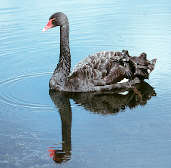
Migrating Black swan
In his famous analogy Karl Popper said" if all swan are white ,we should not be looking for great quantities of white swan,we should instead look for a single black one"
Popper has argued (I think successfully) that a scientific idea can never be proven true, because because no matter how many observations seem to agree with it, it may still be wrong. On the other hand, a single contrary experiment or series of observations can prove a theory forever false.
Nobel laureate Niels Born also commentated on the problem of induction.
" . no observation or experiment, however extended, can give more than a finite number of repetitions'; therefore, 'the statement of a law - B depends on A - always transcends experience. Yet this kind of statement is made everywhere and all the time, and sometimes from scanty material. '
In other words, the logical problem of induction arises from
(1) Hume's discovery (so well expressed by Born) that it is impossible to justify a law by observation or experiment, since it 'transcends experience';
(2) the fact that science proposes and uses laws 'everywhere and all the time'. (Like Hume, Born is struck by the 'scanty material', i.e. the few observed instances upon which the law may be based.) To this we have to add
(3) the principle of empiricism which asserts that in science only observation and experiment may decide upon the acceptance or rejection of scientific statements, including laws and theories.
Recently we have interesting questions arising from the biogenic methane emmisions of living plants http://www.sciencenews.org/articles/20060114/fob1.asp
Or how about the fallacy of sea level changes from polar and glacial melt as disproved to the House of Lords http://www.publications.parliament.uk/pa/ld200506/ldselect/ldeconaf/12/12we18.htm
Or This
Does anyone remember the glaciers that once threatened Florida and caused white spruce trees to grow in Georgia? Archeological evidence proves that sub-Arctic forests grew 18,000 years ago where orange groves and pecan trees now flourish. How about that mini-Ice Age of 1100-1600 A.D.? History books recount the cold weather endured by the Northern Hemisphere during that period. More recently, 20th century weather records detail the paralyzing cold and snow that often visited Western Oregon to freeze the Willamette and Columbia rivers."
http://152.98.240.26/Documents/Plant/mmf.htm
What about the hurricane events unprecedented they say http://www.capmag.com/article.asp?ID=4403
There may be another reason or we do not understand climate as well as we think.What is Russian scientific thought...
There is still no united opinion on the reasons for global warming. Scientists from the Central Aerological Observatory of the RF hydrometeorological organization Roshydromet and the Lebedev Physics Institute have voiced their views on the subject.
They believe that cosmic rays play a large role in this process and they offer a physical explanation for this effect.
A flow of cosmic rays constantly falls onto the upper limit of the atmosphere. Under interaction with the atmosphere it gives rise to secondary radiation. A maximal flow of secondary cosmic rays is observed in the stratosphere at altitudes of 15-20km and it is affected by solar activity. Cosmic rays ionize air in the stratosphere and the troposphere, which explains the electrical conductivity of air at these altitudes and the electrical activity of storm clouds. The electrical field created by the Earth’s charge accelerates adherence of light ions to uncharged aerosol particles, and charged aerosol particles become the centres of water vapour condensation, on which cloud droplets arise, far more easily than uncharged particles. This leads to an increase in nebulosity in the lower part of the troposphere, which influences the flow of solar energy and, accordingly, the temperature of the near-Earth atmosphere.
A reduction in the flow of cosmic rays, observed in the 20th Century, is accompanied by a fall in the speed of ionisation and electrical conductivity of air in the stratosphere and the troposphere, a drop in the storm activity and voltage of the Earth’s electrical field and a reduction of low cloud cover, meaning a rise in the temperature of the near-Earth layer of air.A jump is expected in the 200-year cycle of the flow of cosmic rays in the 21st Century and the authors of the hypothesis believe there will be not a further warming of the climate but quite the opposite – climate cooling.
Time will tell which of the directly contradicting forecasts for climate this century will be justified.
http://news.bbc.co.uk/2/hi/europe/4631666.stm hmm
And today another black swan landed on the frozen lake
Sea level rise due to increased melting of mountain glaciers and polar ice caps will be much lower in the 21st Century than previously estimated. However, decay of mountain glaciers in due to global warming will be much more rapid than previously thought. These are the major results of a study conducted in cooperation with the Alfred-Wegener-Institute for Polar and Marine Research, which is published in the scientific magazine Nature.
Of course this contradictory analysis in the scientific ? journal nature has differing observations
http://www.niwascience.co.nz/pubs/mr/archive/2005-08-30-1

0 Comments:
Post a Comment
<< Home